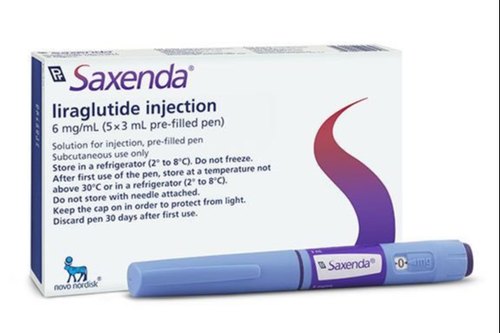How Long Does It Take For Saxenda To Work?

Saxenda is a brand of liraglutide, a medication similar to a hormone that occurs naturally in the body and helps control blood sugar, insulin levels, and digestion. Saxenda is an injectable prescription medicine that may help some obese adults or overweight adults who also have weight-related medical problems, and children aged 12 to 17 years with a body weight above 132 pounds (60 kg) and obesity, to lose weight and keep the weight off. It is used together with diet and exercise. Saxenda is not for treating type 1 or type 2 diabetes. Saxenda is not a weight-loss medicine or appetite suppressant.
Over time, people who have diabetes and high blood sugar can develop serious or life-threatening complications, including heart disease, stroke, kidney problems, nerve damage, and eye problems. Using medication(s), making lifestyle changes (e.g., diet, exercise, quitting smoking), and regularly checking your blood sugar may help to manage your diabetes and improve your health. This therapy may also decrease your chances of having a heart attack, stroke, or other diabetes-related complications such as kidney failure, nerve damage (numb, cold legs or feet; decreased sexual ability in men and women), eye problems, including changes or loss of vision, or gum disease. Your doctor and other healthcare providers will talk to you about the best way to manage your diabetes.
How Saxenda works
Saxenda injection is in a class of medications called incretin mimetics. It works by helping the pancreas to release the right amount of insulin when blood sugar levels are high. Insulin helps move sugar from the blood into other body tissues where it is used for energy. Liraglutide injection also slows the emptying of the stomach and may decrease appetite and cause weight loss.
How should Saxenda be used?
Saxenda is usually injected once a day with or without food. Use liraglutide injection at around the same time every day. Follow the directions on your prescription label carefully, and ask your doctor or pharmacist to explain any part you do not understand. Use Saxenda injection exactly as directed. Do not use more or less of it or use it more often than prescribed by your doctor.
If you are an adult using liraglutide injection (Saxenda) for weight loss and you do not lose a certain amount of weight after 16 weeks of treatment, it is not likely that you will benefit from using this medication. If you are a child 12 years of age and older using liraglutide injection (Saxenda) and you do not lose a certain amount of weight after 12 weeks on the maintenance dose, it is not likely that you will benefit from using this medication. Your doctor may tell you to stop using liraglutide injection (Saxenda) if you do not lose enough weight during the first weeks of your treatment.
You will need to buy needles separately. Ask your doctor or pharmacist what type of needles you will need to inject your medication. Be sure to read and understand the manufacturer’s instructions for injecting liraglutide using the pen. Also make sure you know how and when to set up a new pen, and what to do if you drop your pen. If you are blind or have poor eyesight and cannot read the dose counter on the pen, do not use this pen without help. Ask your doctor or pharmacist to show you how to use the pen. Follow the directions carefully.
How long does it take for Saxenda to work?
Saxenda begins to work within 2 weeks and continues for 9 to 12 months. It exerts its effects by acting on receptors in the brain that control your appetite, causing you to feel fuller and less hungry. This may help you eat less food and reduce your body weight.
What side effects can this medication cause?
This medication may cause changes in your blood sugar. You should know the symptoms of low and high blood sugar and what to do if you have these symptoms.
Liraglutide injection may cause side effects. Tell your doctor if any of these symptoms are severe or do not go away:
- headache
- constipation
- heartburn
- runny nose, sneezing, or cough
- tiredness
- difficulty urinating or pain or burning on urination
- injection site rash or redness
Some side effects can be serious. If you experience either of these symptoms, stop using liraglutide injection and call your doctor immediately:
- ongoing pain that begins in the upper left or middle of the stomach but may spread to the back
- new or worsening depression
- thinking about harming or killing yourself
- unusual changes in mood or behavior
- vomiting
- nausea
- diarrhea
- clay-colored stools
- yellow eyes or skin
- heart pounding
- fainting or feeling dizzy
- swelling of the eyes, face, mouth, tongue, or throat
- rash
- itching
- difficulty breathing or swallowing
Liraglutide injection may cause other side effects. Call your doctor if you have any unusual problems while using this medication.
Can you overdose on Saxenda?
Overdoses have been reported in clinical trials and post-marketing use of liraglutide. Effects have included severe nausea and severe vomiting. In the event of overdosage, appropriate supportive treatment should be initiated according to the patient’s clinical signs and symptoms.
In case of overdose, call the poison control helpline at 1-800-222-1222. Information is also available online at https://www.poisonhelp.org/help. If the victim has collapsed, had a seizure, has trouble breathing, or can’t be awakened, immediately call emergency services at 911.





